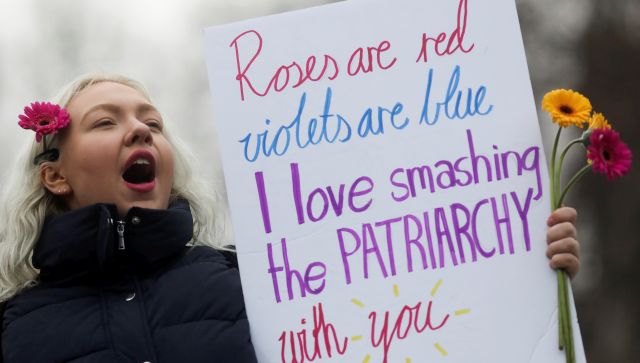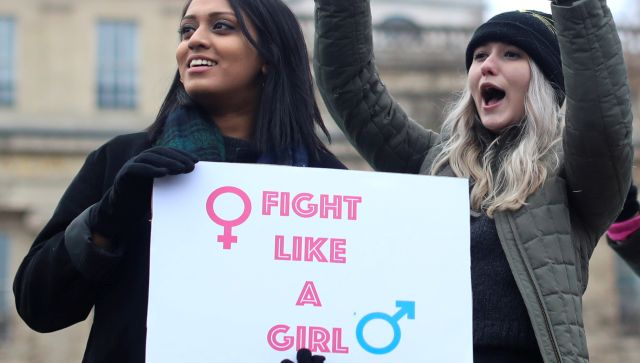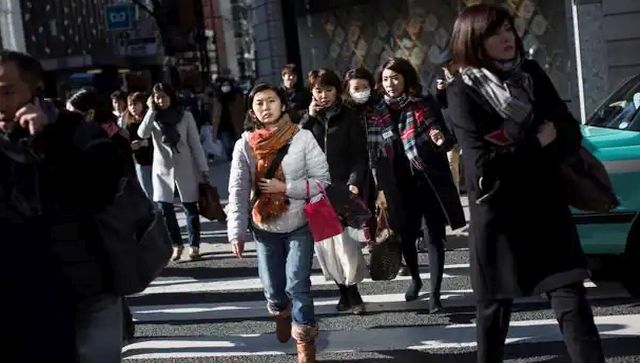What’s Australia’s new law to tackle gender pay gap? Which countries have similar rules?
Australia has introduced a law that makes it mandatory to report disparities between the incomes of men and women. The UK and the European Union have similar legislations, and in Iceland, it’s illegal to pay men more than women

Women workers hold up a sign demanding equal pay during a protest in Melbourne. On Thursday, Australia passed legislation requiring firms with more than 100 employees to publish their gender pay gap from early next year. File photo/Reuters
We are ready to let AI take over our jobs but not ready to pay women equally yet. The gender pay gap is real and women, even in some of the world’s advanced economies, get the short end of the stick. Australia aims to change that.
The term ‘gender pay gap’ refers to women earning less than men for similar roles. It also includes women filling fewer positions in leadership roles and on company boards, or quitting full-time work to tend to the family.
Australia’s new law
In a big step toward improving working conditions for women in the country, the Labor government on Thursday passed a law that requires firms with more than 100 employees to reveal their gender pay gaps from early next year. This will allow workers to compare the gender pay gaps in different workplaces since the data from such companies will be published online.
Until now, the country required organisations to report inequality in income to the Workplace Gender Equality Agency (WGEA), an Australian government statutory body, which publishes the information by industry. However, it did not have the power to publicly publish details of company by company.
The new federal laws require the agency to release data for private businesses from early 2024 and for Commonwealth public sector employees the following year, according to a report by The Syndey Morning Herald (SMH).
In early February, the Australian government introduced Workplace Gender Equality Amendment (Closing the Gender Pay Gap) Bill 2023 into Parliament. It reviewed the “minimum standard” gender equality benchmark provided by the Workplace Gender Equality Act 2012 to increase employer transparency.

‘Get serious about change’
WGEA chief executive Mary Wooldridge told SMH that going public with pay gaps would make businesses accountable. She said that this was an “opportunity for employers who may have been slow to prioritise gender equality to get serious about change”.
“Publishing employer gender pay gaps will provide [workers] deeper insights on their employer’s progress, while jobseekers can get a clearer indication of a prospective employer’s commitment to ensuring the contributions of all employees are equally valued and rewarded,” Wooldridge told SMH.
The country’s Sex Discrimination Commissioner Kate Jenkins said that the change was an important step in improving the economic security of women, SMH reports. “The new legislation will also play an important role in encouraging business, industry and government to be more active in their efforts to reduce the gender pay gap,” she added.

Australia’s gender gap problem
In 2023, Australia’s gender pay gap was 13.3 per cent, according to official data. The divide has hardly improved in years. It was 14.1 per cent six months ago and this is a small progress on the earlier low of 13.4 per cent before the COVID-19 pandemic.
Women in the country earn 87 cents on average for every dollar men earn. Their average weekly ordinary full-time earnings across all industries and occupations were at $1,653.60. That was AUD 253.50 less than the average of male counterparts at AUD 1,907.10, according to the Australian Bureau of Statistics figures
In the public sector, the gap was 12.5 per cent with men earning an average of AUD 2,091.20 and women making AUD 1,857.50. The private sector gap was wider – men averaged AUD 1,874.40 compared with women who earned AUD 1,573.
Australia’s Minister for Women Katy Gallagher said, “On current projections, it will take another 26 years to close the gender pay gap.”
“Women have waited long enough for the pay gap to close – this government will not let them wait another quarter of a century,” she added in a statement, according to Reuters.
But there is also unpaid work – household chores, taking care of children and senior family members – that needs to be taken into account. The responsibility invariably falls on women. “Even in households where both partners work full-time, women report doing 40 per cent more unpaid work than men” according to Australia’s federal treasury.
The government is trying to usher in a change. Earlier this month, Australia’s parliament passed legislation increasing paid parental leave from 18 to 26 weeks, shared between both parents. This makes it easier for new fathers to obtain paid leave.
All the measures are aimed to fasten workplace equality in Australia where the pay gap between men and women is higher than the OECD (Organisation for Economic Co-operation and Development) average of 11.9 per cent.

Countries with similar laws
In 2018, Iceland became the first country in the world to legalise equal pay. A new law made it illegal to pay men more than women. Companies and government agencies employing at least 25 people have to obtain government certification of their equal-pay policies, according to a report in Al Jazeera.
Britain made it mandatory in 2017 for all companies with more than 250 employees to report the difference in earnings between male and female staff. However, there has been limited progress in narrowing the gap, reports Bloomberg.
Men were paid a median of 9.7 per cent more than women in 2021, compared with 10 per cent in 2020, according to a Bloomberg News analysis of filings submitted to the government. The gap was 9.2 per cent when businesses were first required to report the data in 2017.
In 2021, the European Union proposed a directive similar to the UK. In April 2022, the EU Parliament demanded that EU companies with at least 50 employees are required to disclose information that makes it easier for those working for the same employer to compare salaries and expose existing gender pay gaps within the organisation. All member states have been given two years to transpose the directive into a national law.

In Japan, companies with 301 or more employees are required to disclose the differences in pay between men and women annually within three months. This is part of Prime Minister Fumio Kishida’s “new capitalism” policy. From this fiscal year, companies’ securities reports must also include the ratio of women in management positions and the percentage of male employees taking childcare leave, reports Bloomberg.
Japan’s gender pay gap is the largest among the Group of Seven nations. Women’s share of labour income in Japan was just 28.2 per cent in 2020, according to the World Equality Report.
A lot needs to be done to make the workplace equal. Worldwide, women are paid about 20 per cent less than men, the International Labour Organization estimates. But some countries are doing better than others. According to the World Economic Forum’s “Global Gender Gap Report 2022”, Iceland is the most gender-equal country in the world. Others in the top-five list are Finland, Norway and Sweden and New Zealand. The United States is ranked 27th, the UK 22nd and Australia 43rd. India comes 135th.
According to the World Economic Forum, it would take another 132 years to close the global gender gap. But why should women, who constitute half the population of the world, wait so long? Shouldn’t every day be Equal Pay Day?
With inputs from agencies
Read all the Latest News, Trending News, Cricket News, Bollywood News,
India News and Entertainment News here. Follow us on Facebook, Twitter and Instagram.
also read

India vs Australia 1st ODI Live Streaming: When and where to watch IND vs AUS 1st ODI
Team India sealed a 2-1 win against the visitors and qualified for the ICC World Test Championship final. Hardik Pandya will captain the Indian side in the first ODI as Rohit Sharma will be unavailable due to family commitments.

Australia to buy up to 220 Tomahawk missiles from the US
The deal comes days after Australia announced it would buy nuclear-powered attack submarines from the US to modernise its fleet amid growing concern about China's influence in the Indo-Pacific

'Australia does not believe in violence': Envoy over pro-Khalistanis forcing Brisbane's Indian Consulate to close down
On Wednesday, it was reported that pro-Khalistan slogans were raised against Hindus at the Indian Consulate located on Swann Road in the Taringa suburb of Brisbane
